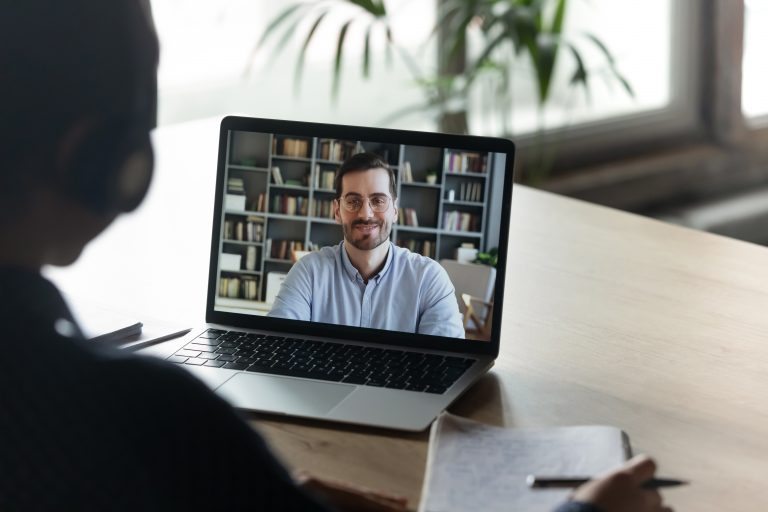The Pros and Cons of virtual interviews when hiring
Posted: 01 Jul 2021
As the world continues to change due to the Coronavirus pandemic, so must our ways of working. More people are working from home than ever before, and for many companies, it’s business as usual. This includes hiring. But how are companies navigating the hiring process when people are required to stay at home? Simple – they’re shifting their face to face interview strategy to a virtual one. Remote interviews have grown in popularity in recent years, for example telephone or Skype, saving both hiring manager and candidate a great deal of time and expense. Only the best of the bunch would then progress to a more formal, in-person interview.
Now we’re living in a Covid world where we have to adhere to social distancing, virtual interviews are not only essential, but are now more comprehensive as they are not just preceding but wholly replacing the face to face interview altogether.
More and more businesses are using video technology to interview potential employees, and it can have its advantages, but it can also have its drawbacks. Read on for the advantages and disadvantages.
Advantages
Time savings
Hiring managers can conduct brief first round interviews remotely, rather than lengthy in-person first interviews, enabling them to process a high number of applicants and shortlist hot candidates quicker and more efficiently. Time is also saved when it comes to scheduling interviews, as finding a time when both parties (or multiple people) are available can be time consuming and tricky. The problem of candidates negotiating time away from the office to attend interviews is no longer an issue, and remote interviews can be scheduled for times when it would otherwise be difficult to make it into the office for an in-person meeting.
Increase in productivity
Conducting remote interviews enables clients to go straight back to what they were doing pre interview. Face to face interviews always take longer, with general chit chat, showing candidates around the office, and introducing them to staff members etc.
Cost savings
Some businesses pay for candidates’ travel expenses, or they may have to hire external meeting space or venues to conduct the interviews. Virtual interviewing removes such costs.
Playback
Having interviewed a number of candidates, it can be difficult for hiring managers to remember who said what, or who stood
out. Video software often allows for recording, so the hiring manager can watch the interview again, making shortlisting easier.
They can also share the interview with colleagues or other hiring managers to watch at a later time.
Assess virtual communication skills
Many businesses offered remote working pre Covid, and some companies are in the business of utilising full time remote
workers (perhaps even from different countries). Interviewing virtually allows the hiring manager to see first hand how a
candidate would perform in a remote role, and get a feel for their communication skills and body language, etc.
Less pressure on the candidates
Some candidates experience incredible nerves, stress or anxiety before an interview, which can prevent them from showcasing their true potential, or their best qualities. Interviewing virtually can eliminate this stress, allowing candidates to feel more relaxed, increasing the likelihood of them performing at their best, and allowing hiring managers to see what’s underneath.
Expands talent pool
Virtual interviewing allows for a much wider reach when it comes to the pool of candidates who are available. Some companies miss out on excellent talent due to their physical location, but remote interviewing (and the likelihood of remote work for the foreseeable) may attract candidates from much further afield who would not normally consider the opportunity.
Disadvantages
Technology fails
The advancement in technology is incredible, but it doesn’t come without its glitches. From poor internet connections or a
complete loss of WiFi, substandard sound quality, to delays or time lapses that result in people speaking over each other…
some things can’t be helped, but most problems can be avoided with a trial run.
Lack of personal connection
It’s harder to read people and build up rapport via video software. When people meet face to face they usually get a general feel for someone, as they exude a certain energy. This goes, with remote interviewing.
Unable to show them around the office
In a candidate driven market, gone are the days when the most important factor was ‘Is the candidate right for us?’ Now, in a candidate driven market, applicants tend to have more options, and hiring managers are having to work harder to sell their role and company to the applicant. For companies who boast impressive office space and amenities, the inability to show candidates around and let them get a feel for the workspace, can be a huge disadvantage.
Unable to introduce candidates to potential co-workers
Most candidates want to meet their potential coworkers, get a feel for how happy they are in the workplace, and see how
friendly they are. Not being able to do this is a huge disadvantage for companies who boast first class teams.
Unfair assessment
Not everyone is camera confident, but unfortunately candidates can be judged on their appearance or their lack of confidence via video, and discounted unfairly.
Legal issues
With the emergence of legislation such as GDPR, it’s important to know what you can and cannot do with people’s personal information, and it’s even more important to disclose to candidates what you will do with their information (or recorded video interview) and how it will be stored. It’s also essential to ensure you have measures in place to ensure the video interview selection process is non discriminatory.
Jiyu Consulting is an IT recruitment company that improves the quality and efficiency of the recruitment process.
If you are a client and you’re looking to hire exceptional talent, call us or drop us a line, and don’t forget to connect on LinkedIn!
